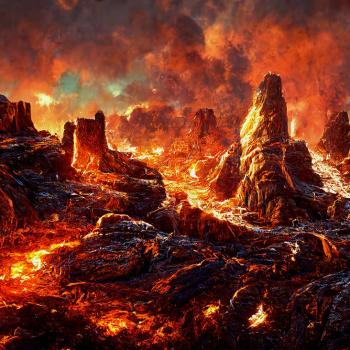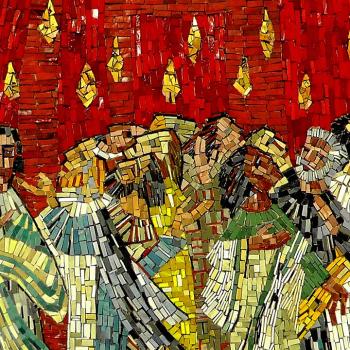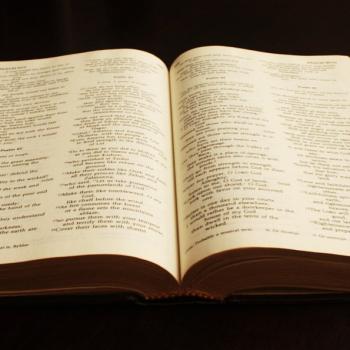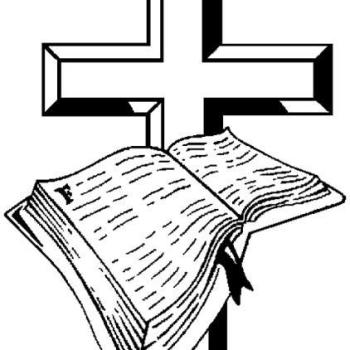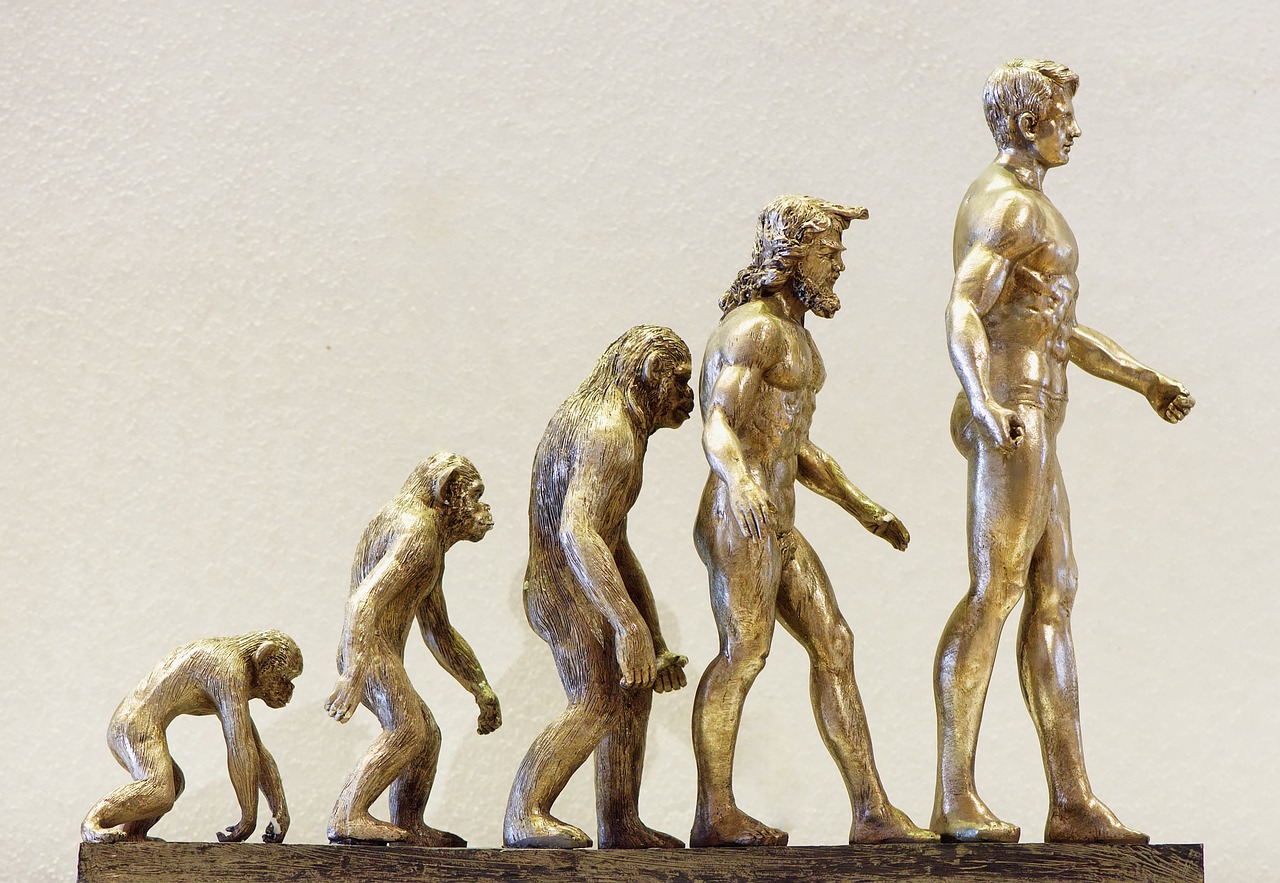
Two Inerrant Books
God has given us two inerrant books which we can study and draw knowledge from. They are the book we know as the Bible, and the book we know as nature. Since God is the author of both of these books, they cannot conflict one with the other. The truths of the Bible cannot conflict with the truths of nature. If they do seem to conflict, then either our understanding of the Bible is flawed, or our understanding of nature is flawed. Truth cannot contradict truth. So keep that in mind as we go through this article.
Now, having said that, I want to get into this discussion on Genesis and Evolution by initially giving a brief overview of what the Church teaches regarding the first 3 chapters of Genesis, and then by examining the 4 points of view – the four positions – that are possible for a person to hold in regard to Genesis and Evolution. Those four positions are: 1) Young Earth Creationism, 2) Old Earth Creationism, 3) Theistic Evolution, and 4) Atheistic Evolution, and I’ll talk about each of them individually in just a few moments.
Nine Teachings of the Church on the 1st 3 Chapters of Genesis
What Does the Catechism Say?
These nine items are taken from a statement issued by the Pontifical Biblical Commission in June of 1909, and approved by Pope Pius X. Now, someone might say, “John, 1909! That’s pre-Vatican II! That’s a long time ago and a lot has happened in science and theology since then.” Well, first of all, whenever someone objects to something in the Church because it was “pre-Vatican II,” I always remind them that Jesus was pre-Vatican II. The Bible was pre-Vatican II. The Eucharist was pre-Vatican II, and so on. So that’s an absurd objection.
But, lest anyone doubt that these nine teachings about the first three chapters of Genesis are somehow “outdated,” and that the Church no longer teaches such things, or that they have become irrelevant, or some such thing, let me give you the paragraphs that correspond to each of these teachings as found in the Catechism of the Catholic Church. That’s right, the Catechism of the Catholic Church, published in 1994, gives these same nine teachings about Genesis that the 1909 Pontifical Biblical Commission gave:
1. The creation of all things out of nothing by God at the beginning of time. CCC #’s 296-299
2. The special creation of man. CCC #’s 355-358
3. The creation of woman from man. CCC #’s 371, 766
4. All of humanity is descended from an original pair of human beings. CCC #’s 54-55, 359-360, 375, 390-392, 402-405, 407, 416-417, 419
(These paragraphs talk of our First parents; and of a Personal sin committed by them.)
5. Adam and Eve were created in an original state of holiness, justice, and immortality. CCC #’s 374-379, 384, 398, 415-416
6. A divine command was laid upon man to prove his obedience to God. CCC #’s 396-397, 399
7. The transgression of that Divine Command at the instigation of Satan. CCC #’s 379, 390-392, 394-395, 397-398, 413-415
8. The loss of the state of holiness, justice, and immortality of our 1st parents. CCC #’s 379, 390, 399-400, 410
9. The promise of a future Redeemer. CCC #’s 410-411
Four Views on Genesis and Evolution
Okay, that’s a general overview of Church teaching on Genesis and creation. Now, let’s look at the four possible positions someone can hold in regard to Genesis and Evolution.
Young Earth Creationism
Let’s start by examining Young Earth Creationism. Young Earth Creationism is the belief that the creation account in Genesis 1 is to be taken exactly as it is written in the pages of the Bible. God created everything out of nothing in six 24-hour days. Adam and Eve were the first human beings, with Eve being created from Adam, and all of humanity is descended from them. In addition, we’re to take the words of the genealogy of Adam – in Genesis, chapter 5 – and the genealogy of Shem – in Genesis, chapter 11 – exactly as they are written, and when you add up the years of the lives of Seth and Enoch and Methuselah and Arpachshad and Eber and Nahor and the others from Adam down to Abraham, and add in the amount of time from Abraham to now, Young Earthers calculate the earth, and all of the universe, to be about 6000 to 7000 years old. Thus the term, “Young Earth.” They do not believe the Earth is billions of years old, and they do not believe in what I call inter-species, or macro, evolution. They do not believe that man evolved over millions of years from an ape or an ape-like creature.Those are the general beliefs of Young Earthers. There are, however, some problems with Young Earth Creationism. The first problem is a biblical problem. You see, if take the words of Genesis, chapter 1, as meaning exactly what they say — that there is no deeper meaning there that the author was trying to convey — then it seems logical to take the words of Genesis, chapter 2, in the same way. But that presents a problem because in Genesis 1, the order of creation, beginning in verse 11, is: first plants then animals then Adam and Eve. However, in Genesis 2, the order of creation, beginning in verse 5, is: first Adam then plants then animals then Eve. It’s a different order. Adam is created before the plants and the animals in Genesis 2 and Eve is created after. The Young Earth interpretation of Scripture seems to result in a conflict between Genesis 1 and Genesis 2.
Also, in Genesis 1, we have morning and evening from day 1, when God creates the light and separates the light from the darkness. How do you have morning? Well, you have morning when the Earth rotates in such a way that the part of it you are living on is exposed to the sun…we call that morning. The problem is, though, God doesn’t create the sun until the 4th day. So how do you have morning and evening for 3 days before the sun is created? How do you have morning and evening, without the sun? And, what was the light God created on the 1st day if it wasn’t the sun? So, there are some biblical problems with Young Earth Creationism.
There are also some very obvious scientific problems with Young Earth Creationism. The prevailing views in astronomy, physics, biology, chemistry, paleontology, and pretty much every other scientific discipline you can think of tells us that the Earth, and the universe, are billions of years old. This is not to say, however, that Young Earthers dismiss science outright as if religion simply trumps science and no discussion to the contrary is necessary. Some folks think that is the case. Not at all. They simply believe the science that says the universe is about 13 billion years old and that the Earth is 4 or 5 billion years old is fundamentally flawed in its methodology. And they have seemingly rational arguments about the science and they offer evidence to back up their points of view.
The problem is, though, their arguments in regard to science — and I’ve read a number of books and articles arguing the Young Earth position — their arguments in regard to science are often so esoteric that they are basically useless to the average person. For example, they give reasons for why they believe that carbon-14 dating techniques are inherently flawed. And why geological dating methods are inherently flawed. Why the properties of some radiation field encircling the sun supposedly prove the solar system is only a few thousand years old. Why the Hubble telescope really isn’t picking up light from stars that are millions of light years away, and so on.
But, unless one is a trained astronomer or geologist or mathematician or physicist or chemist or some such thing, you have no way of knowing if these arguments are valid or not. If they can’t be broken down in such a way that the average layman can understand them and verify them, then they are easily dismissed and, personally, I do indeed dismiss them. My reasoning is that since I have to rely solely on the knowledge of experts from many different scientific fields in these matters, and that the majority of these experts and scientists -– Catholic, Protestant, Jewish, Hindu, atheist, etc. -– do not give credence to these arguments being put forth by the Young Earth Creationists, then I am not going to be convinced by them.
Now, I’m not saying that the Young Earthers are definitively wrong, I’m simply saying that the arguments I have seen and heard — both biblical and scientific — are not convincing to me. I am, however, always open to being offered more evidence and to being convinced otherwise.
Now, it might surprise you to know, that Catholics are allowed, by the Church, to believe in Young Earth Creationism. As far as I know, the Church has never definitively ruled on the age of the earth and the universe and on the mechanism of creation, and I doubt it ever will, as those are matters proper to science, not to faith and morals. So, while Young Earth Creationism is more prevalent in the Protestant world than the Catholic world, there are a number of Catholics who are indeed Young Earthers and the Church gives them the latitude to hold that belief. My main problem with a number of these Catholic Young Earthers, though, is that they tend to argue that Young Earth Creationism is a dogmatic teaching of the Church, and I have seen nothing that would make me believe that.
Old Earth Creationism
Moving on now to Old Earth Creationism. Old Earth Creationists believe that God did indeed create everything out of nothing at the beginning of time, that Adam and Eve were the first human beings and that Eve was created from Adam, and that all of humanity is descended from them, just like the Young Earth Creationists, do. But, contrary to Young Earthers, Old Earthers believe the beginning of time was several billion years ago. They do not believe that the six days of creation in Genesis 1 are six actual 24-hour days. They have no problem with the current science that says the universe is 13 billion years old and that the Earth is 4 or 5 billion years old.
The Old Earth interpretation of the creation accounts in Genesis, chapters 1 and 2, takes the view that the author was not trying to give us a linear timeline for creation or a scientific treatise on the mechanisms of creation. He is simply telling the story in the best way he knows how — given his level of knowledge at the time — to convey the truths of creation. This interpretation gets around the problem the Young Earthers have with the two different creation accounts because, again, Old Earthers believe the author was not trying to give a timeline for creation, but was simply making the point, in both creation accounts, that man is the pinnacle of creation. There is no conflict between the two creation accounts because the author is not trying to give us a linear timeline of creation — in either account. The meaning the author was trying to convey went deeper than the mere words on the page.
You know, the Church teaches that we cannot always take the words on the pages of Scripture just at simple face value, because oftentimes the words convey a much deeper meaning. An author can be using words that might seem to mean one thing, if taken at face value, but he actually means something altogether different. For example, if you were to read in a book that it was raining cats and dogs — how do you interpret that? Well, if you take the words at face value, then you believe some really strange meteorological phenomenon was occurring that had dogs and cats falling from the sky like rain. If, however, you understood the idioms of the author’s language, then you would know that the author’s intended meaning was that it was raining really hard. A meaning that is obvious to those of his time, his language, his culture, and so on, but not necessarily obvious to those of another time, language, and culture.
Another example: if I said I went to a concert last night and there were a million people there — would you take those words at simple face value and believe there were exactly one million people at the concert, or would you understand I was simply saying the concert was packed with people?
Now, take that interpretive principle to Scripture. We have a book — or a book that is really a library of books — written over a period of 2000-4000 years ago. Can we just say, “Look, it says 6 days so it means 6 days?” “He said a million people at the concert, so he means a million people at the concert.” Did the author mean six actual 24-hour days, or do those 6 days represent some deeper meaning?
As I mentioned earlier, there are problems with the 6-day interpretation. But, what if each day is simply representing a unknown passage of time? If that’s the case, then some of those problems with the 6-day interpretation go away. After all, Scripture says a day is to God as a thousand years and a thousand years as a day (2 Ptr 3:8). We could also say a day is as a billion years to God, and a billion years as a day, since God is eternal. God lives in one day, the same day, forever. So, many Old Earthers believe that each day simply represents the author’s way of showing some passage of time, and not necessarily in a linear order from day 1 to day 6.
Others believe the author of Genesis was basically using the six days as a literary construct of sorts to convey deeper truths about creation. That he wasn’t trying to tell us anything at all about the order or timing of creation. If you look, for example, at the 1st three days of Genesis 1, in relation to the 2nd three days of Genesis 1, you have a connection. You have the light and the dark on the first day, the heavens and the seas on the 2nd day, and the land and vegetation on the 3rd day. Corresponding to day 1, we have the rulers of the light and dark created on the 4th day — the sun and the moon. Corresponding to day 2, we have the rulers of the heavens and the seas created on the fifth day — the birds and the fishes. Corresponding to day 3, we have the rulers of the land created on the 6th day — the cattle, creeping things, and beasts of the earth. And, finally, at the end of the 6th day, we have the creation of the rulers over all of nature — man.
So, two sets of three days with each set being connected to the other and the connections between the days being three days apart: Days 1 and 4; 2 and 5; 3 and 6. And, guess what? It just so happens, that the number three, in Hebrew, represents “connection.” It also represents holiness. Was the author simply letting us know that all of God’s creations are connected with each other and that they are were all set apart for God — in other words, it was all holy?
Then, on the seventh day, God rests. But this seventh day is also part of the literary construct because the number seven, in Hebrew, represents completeness, or perfection. God created the universe, the earth, the animals, and man, and God’s creation was complete. Plus, in biblical times, to enter into a covenant with someone, you swore an oath. The word for swearing an oath in Hebrew literally means to “seven oneself.” So, did God create the world in six 24-hour days and rested on the seventh, or did the author use the 7 days of creation as a way to tell us that, God’s creation was complete and through the process of creation, God was entering into a covenant with all of creation and, in particular, with man? Something to think about and consider.
So, common to both points of view — Young Earth and Old Earth Creationism — is the belief that God created everything out of nothing and, through a special act, created Adam and Eve at a particular point in time, that Eve was created from Adam, and that all of humanity is descended from this common pair of ancestors — Adam and Eve. Where they disagree, for the most part, is on the timing of it all. However, since Old Earth Creationists have no problem accepting an old age for the Earth, they avoid many of the problems that Young Earth Creationists run into when it comes to science, plus they seem to also avoid the biblical problems that Young Earth Creationists have.
Finally, in regard to Old Earth Creationism, this, too, is a position Catholics are allowed to believe in. Catholics can believe in Young Earth Creationism and Old Earth Creationism.
Theistic Evolution (aka Evolutionary Creationism)
Now, turning to Theistic Evolution. Theistic evolution is the belief that life evolved from lower forms to higher forms (macro evolution – or what I call inter-species evolution) after God’s creation of the earth and the heavens out of nothing as it says in Genesis 1. But, at some point God stepped in with a special creation of Adam and Eve, which was essentially an “ensoulment,” if you will, of pre-existing human-like creatures. God used the process of evolution to get us to the point where He finally stepped in and put a human soul into two human-like creatures.
However, it must be noted, that the Theistic Evolutionists do not believe that all of creation came to be simply as the result of chance, without any purpose whatsoever, and that man evolved from lower life forms purely by accident. In other words, they do not believe, and Catholics cannot believe, in atheistic evolution. We have to believe that there is a God and that He was directly involved in the process of creation and evolution, if you believe in evolution.
So, Theistic Evolutionists, unlike the Young and Old Earthers, accept the science of evolutionary theory. They tend to look at Young Earthers, in particular, but also Old Earthers, as being a bit backwards for not accepting evolutionary theory. Theistic evolutionists are a bit more accepted by the prevailing culture than the Young and Old Earth Creationists are, but that acceptance is not complete by any means.
But, whereas the Theistic Creationists have fewer problems with the scientific community, they do, nevertheless, have some pretty big problems with the Bible and with Church teaching. First of all, as I mentioned at the beginning of this talk, the Church teaches that Eve was created — in some way, shape, or form — from Adam. Exactly how this was done we do not know. Was it a rib from Adam, or is the rib merely a metaphor for whatever the process was? We don’t know for sure, but Eve came from Adam. Evolutionary theory cannot account for that.
Furthermore, as previously mentioned, the Church teaches that Adam and Eve were created in an original state of justice and holiness — they would not suffer or die as long as they “remained in the divine intimacy.” How does that fit in with evolutionary theory? It doesn’t. Immortality cannot be attributed to merely natural processes. Also, the Church teaches that all of mankind is descended from our “first parents,” Adam and Eve. Current evolutionary theory does not support this, although it is moving closer to the Church’s position in this area.
Theistic Evolution is, however, also a position that the Church allows Catholics to believe in, although, with the qualifications that I mentioned that they have to find some way to integrate Eve being formed from Adam, and the original state of immortality of Adam and Eve with evolutionary theory. They also have to find a way to integrate all of mankind being descended from an original pair of human beings with evolutionary theory, although that is not as difficult as the other two items I just mentioned.
And this last point is so important because if all of mankind does not descend from an original pair of human beings, then that impacts our belief on Original Sin, on Baptism, on salvation, on the necessity of Christ coming to die for our sins, and so on. In other words, it strikes at the very heart of our religion.
So, to sum up so far, the Catholic Church allows a person to believe that the Earth is only thousands of years old, and it allows a person to believe that the Earth is billions of years old. It allows a person to believe in evolution, and it allows a person to not believe in evolution. In other words, the Catholic Church allows for a pretty wide range of belief on creation and evolution and the age of the Earth and the universe, as long as those 9 items I mentioned at the beginning of this article are accepted and believed.
I’ll deal with the 4th possibility — Atheistic Evolution — in my next article…
[Check out all of the FREE apologetics materials — written and audio — at my website: BibleChristianSociety.com]






